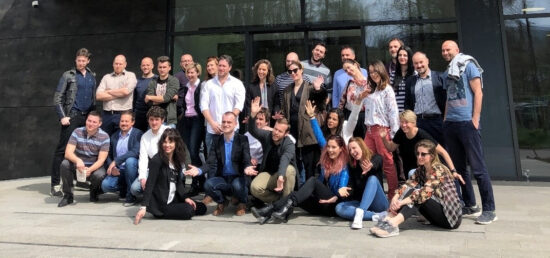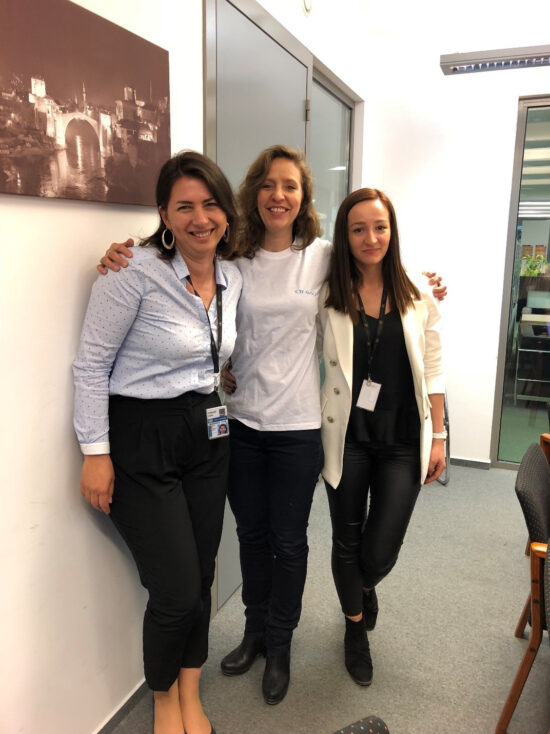By Peggy Parfenoff, President, WorldChicago / Governance Chair, Global Ties U.S. Board of Directors

Alumni of the Professional Fellows Program gather in Banja Luka, Bosnia-Herzegovina. Photo credit: WorldChicago.
WorldChicago hosts hundreds of international visitors each year. However, we often do not know what happens after they have returned home. We might receive a thank you email or a LinkedIn request, but rarely do we go visit them or see for ourselves how the exchange program impacted their careers and lives.
One exception is our Tech Innovation and Entrepreneurship Fellowship Program. Sponsored by the U.S. Department of State as part of the Professional Fellows Program, the program brings 16 emerging leaders in tech entrepreneurship from Bosnia-Herzegovina, Croatia, Slovenia, and Macedonia to Chicago for four weeks to meet with tech companies and partners. Later in the year, tech entrepreneurs from Chicago travel to Central Europe and meet with alumni, as well as host a tech innovation summit and workshops.
This past April, I had the great fortune to travel to Croatia and Bosnia-Herzegovina with a delegation of six Chicagoans as part of this program. The most rewarding part of the trip was seeing how the program helped the participants become leaders in their fields. For example, Kristina, an alumna who previously believed she could not work for a female supervisor, changed jobs after visiting the Arts and Business Council of Chicago and witnessing women in leadership roles. She now works with UNICEF, which has a more supportive work environment for women and fosters strong team communication.
Tanja from Sarajevo is also working with UNICEF on an IT-related program for girls. She said, “WorldChicago and the Professional Fellowship Program really helped my career; I do not think I would be doing what I am doing today if it was not for the WorldChicago.”
Mizra, also from Sarajevo, said his time in Chicago was invaluable for broadening his perspective. It was his first time meeting people from different economic classes and backgrounds. At WorldChicago’s Fundraising Luncheon, he was amazed that the guests would donate money simply because they cared about our mission. “That the community cares enough to donate is what makes your nation great,” he said. “We are all friends of the United States now, and would not hesitate to do business with U.S. companies. This one program created large ripples in the community.”

Peggy (center) with the IT Girls team at UNICEF in Sarajevo. Photo credit: WorldChicago
It was also great to see that alumni are staying connected. In addition to launching a website, the fellows meet regularly to help maintain connections and integrate new cohorts of the program. For Jako, a Croatian alumnus who also sits on a regional board of directors, these connections make it easier to secure meeting logistics and panelists for events.
As part of the exchange, we hosted a tech summit in Banja Luka, Bosnia-Herzegovina. There are several reasons we chose this location instead of the capital, Sarajevo: it is not as well known for tech and entrepreneurship, and provided an opportunity for those in the capital to visit a part of the country where most residents identify as Serbian rather than Bosnian.
More importantly, the summit helped serve as a sign of hope in a country where feelings of hopelessness and fear of failure remain strong. Bosnia-Herzegovina continues to struggle with youth unemployment and free speech. Offering young people the opportunity to travel to Chicago and experience the entrepreneurship culture in the U.S.—where failure is almost expected, but optimism is high—can be life-changing. This trip reminded me of why organizations like WorldChicago exist and how exchanges can continue making a positive change in the world.
